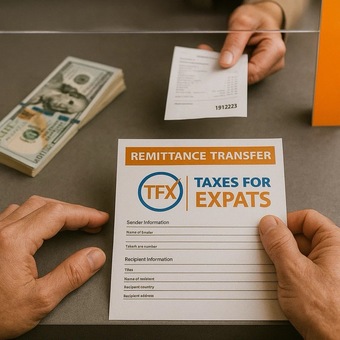IRS Form 8938: What it is, who needs to file, and why you shouldn’t ignore it

2026 filing season update: Filing your 2025 tax return? Form 8938 requirements remain unchanged for the 2025 tax year. If your specified foreign financial assets exceeded the applicable thresholds at any point in 2025, you must file Form 8938 with your return.
Deadline: April 15, 2026 (October 15, 2026 with extension). Living abroad? Your filing deadline is automatically June 15, 2026 (October 15 with extension).
If you’ve got money abroad and think the IRS won’t notice – think again.
Uncle Sam might not be watching your every move, but he is very interested in your foreign financial assets. That’s where Form 8938 comes in.
Whether you’re a globe-trotting expat, a green card holder with foreign investments, or someone whose retirement account lives in another timezone, Form 8938 – Statement of Specified Foreign Financial Assets – may apply to you.
And ignoring it? That could cost you thousands in penalties.
Let’s break it down, CPA-style – minus the jargon, plus a few “you’ll thank us later” moments.
What is Form 8938?
Form 8938 is part of the IRS’s compliance arsenal under FATCA – the Foreign Account Tax Compliance Act.
Enacted in 2010, FATCA was designed to crack down on offshore tax evasion by increasing visibility into US taxpayers' foreign financial interests. For the 2025 tax year and beyond, these rules continue to apply.
Also read – FATCA reporting & filing requirements
Form 8938 specifically requires taxpayers to report certain foreign assets – think foreign bank accounts, stocks, pensions, or partnerships – if their total value exceeds IRS thresholds (more on those shortly).
"Think of Form 8938 as the IRS saying, 'It's not that we don't trust you... we just need everything in writing.'"
Unlike other IRS forms that only trigger based on income, Form 8938 is about the value of your foreign financial assets – even if they’re not earning income.
So yes, that sleepy investment account in France you forgot about? Still reportable.
Why does the IRS care so much?
Because globalization has made it easier than ever to earn, invest, and hold money across borders – and much harder for governments to track it. FATCA and Form 8938 are part of a global push for financial transparency.
Under FATCA, foreign financial institutions are also required to report account information for US taxpayers. So even if you don’t tell the IRS, your bank might – and that’s never how you want them to find out.
Not just for millionaires
“If you have a few accounts abroad, your asset total adds up quickly – and so does your responsibility to report.”
Contrary to popular belief, Form 8938 isn’t just for the ultra-wealthy stashing cash in Swiss vaults.
Many middle-class expats and globally mobile professionals hit the filing threshold – especially once pensions, joint accounts, and currency exchange rates are factored in.
Who needs to file Form 8938?
You're required to file Form 8938 if:
- You’re a US citizen, resident alien, or certain non-resident aliens
- You hold interest in specified foreign financial assets
- The total value exceeds the IRS reporting threshold (which depends on your filing status and where you live)
Filing thresholds
2025/2026 Thresholds Confirmed: The IRS has Not changed Form 8938 reporting thresholds for the 2025 tax year (filing in 2026).
The threshold amounts remain as shown below:
| Filing Status | US Residents | Foreign Residents (Expatriates) |
|---|---|---|
| Single | $50,000 on Dec 31 or $75,000 at any time | $200,000 on Dec 31 or $300,000 at any time |
| Married Filing Jointly | $100,000 / $150,000 | $400,000 / $600,000 |
| Married Filing Separately | $50,000 / $75,000 | $200,000 / $300,000 |
These thresholds have remained consistent since 2011, providing stability for expat tax planning.
Pro tip: Living abroad? The thresholds are significantly higher – but don’t get too comfy. Even “small” investments can push you over.
What counts as a “specified foreign financial asset”?
“If it lives abroad and generates value for you – there’s a good chance the IRS wants it on Form 8938.”
It’s broader than just a foreign bank account.
Here's what typically gets reported:
Reportable assets:
- Foreign bank and brokerage accounts
- Foreign stocks or securities not held through a US financial institution
- Interests in foreign partnerships, corporations, or trusts
- Foreign mutual funds
- Foreign pensions and retirement accounts (yes, often required)
- Certain life insurance or annuity contracts with a cash value
What’s not included:
- Foreign real estate (direct ownership)
- Foreign social security-type benefits
- Assets held in a US-based brokerage (even if the funds are foreign)
What’s the difference between Form 8938 and FBAR?
Great question – and one that trips up many expats.
While both forms report foreign assets, they’re not the same thing.
Comparison snapshot
| Feature | Form 8938 | FBAR (FinCEN 114) |
|---|---|---|
| Filed with | IRS (attached to Form 1040) | FinCEN (online via BSA e-filing) |
| Trigger threshold | From $50,000 (depends on status & location) | $10,000 aggregate in foreign accounts |
| Who files | Only if filing a US tax return | Anyone with foreign accounts over the threshold |
| Assets reported | Broader range: includes foreign stocks, pensions, partnerships | Only financial accounts (bank, brokerage, etc.) |
| Due date | With your tax return (April 15 / Oct 15 with extension) | April 15 (automatic extension to Oct 15) |
NOTE! Some assets require BOTH forms. Don’t assume one covers the other – they’re separate requirements.
How to file Form 8938
Form 8938 is attached to your Form 1040 when filing your federal tax return. No standalone submission.
For the 2026 filing season: If you're filing your 2025 tax return, Form 8938 is due by April 15, 2026 (same as your Form 1040).
Living abroad? You have until June 15, 2026, or October 15, 2026, if you file an extension.
Here’s the high-level step-by-step process:
- Gather foreign asset info – balances, account numbers, institutions, countries, etc.
- Determine maximum value during the year (not just year-end)
- Complete Form 8938 – include detailed sections about the types and values of your assets
- Attach it to your tax return – and file by the tax deadline
If you work with TFX, we’ll handle all of this for you. No hunting down bank statements in Dutch or decoding IRS instructions solo.
Form 8938 preview
What happens if I don’t file Form 8938?
“When it comes to the IRS and foreign assets, ignorance isn’t bliss – it’s expensive.”
Let’s keep this short and scary:
- $10,000 penalty for failing to file
- Additional $10,000 per 30 days (up to $50,000) if you continue ignoring notices
- Criminal penalties possible for willful noncompliance
Oh, and if the IRS figures out your foreign income wasn’t reported because you didn’t disclose the asset?
That can lead to accuracy-related penalties or worse.
What if I forgot to file in a previous year?
Good news: The IRS does allow for correction, especially if your noncompliance wasn’t willful.
Through streamlined filing procedures and amended returns, you may be able to get back on track penalty-free – but timing matters.
We’ve helped hundreds of clients navigate this.
Reach out before the IRS reaches you.
New to professional tax help?
See how it works
Real expat scenarios where Form 8938 applies
| Scenario | Why Form 8938 Is Required |
|---|---|
| US expat owns €90,000 in a German brokerage | Crosses threshold; reportable asset |
| Green card holder with $80K in Swiss pension | Foreign retirement account; report it |
| Digital nomad holds $45K in crypto offshore exchange + $40K in bank | Total exceeds $75K mid-year threshold |
| Couple living in France with €400K joint savings | Threshold for married expats is $400K+ |
Final thoughts: Don’t let Form 8938 become an expensive surprise
Form 8938 might not get as much buzz as FBAR or FEIE, but if you're an expat with assets overseas, it's one of the most important forms you’ve never heard of.
And remember – it’s not just about avoiding penalties. It’s about being in good standing with the IRS so you can enjoy life abroad with one less tax headache.
At TaxesForExpats, we’ve helped over 50,000 expats file accurately and avoid costly mistakes. Our human CPAs (no bots here) guide you through every step.
We speak IRS – and expat.

This guide is for info purposes, not legal advice.
Always consult a tax pro for your specific case.



